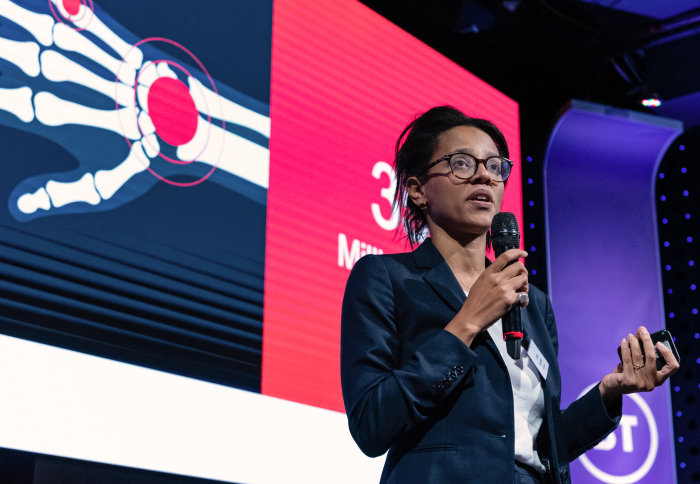Imperial and MIT showcase innovative research on AI, blockchain and biosensors

Letizia Gionfrida, founder of Arthronica
Academics and startups from Imperial College London and the Massachusetts Institute of Technology presented their innovative ideas at a conference.
Co-organised by Imperial Business Partners and MIT, the Innovation Journeys Conference brought together industry leaders, academics and startups from both universities to explore and share the latest technological innovations and research.
Imperial Business Partners offers a unique approach to problem-solving for research-driven industries via accelerated access to Imperial’s expertise, talent and facilities.
Entrepreneurial journey
Imperial’s Director of Enterprise Simon Hepworth discussed the university’s role in the entrepreneurial journey, saying it is present at all stages, whether that’s for students or staff.

The College’s enterprising ecosystem is vast, ranging from academic ventures, entrepreneurship competitions and programmes such as WeInnovate and the Enterprise Lab, which supports student innovation.
Dr Hepworth also discussed how the university is on an innovation journey itself and is trying to make it as easy as possible for industrial partners to reach the College’s entrepreneurs, who can help them get their ideas to market.
Student startups
Some of Imperial’s leading student startups showcased their ideas in lightning pitches – find out more about them:
Arthronica is an all-in-one AI-powered platform that can diagnose and monitor musculoskeletal disorders through computer vision. The system uses a camera on a laptop or phone combined with software to measure mobility, functionality and swelling of joints to remotely assess chronic arthritis and provide evidence on the effectiveness of treatment. Arthronica was founded by Letizia Gionfrida, Research Assistant in Imperial’s Department of Bioengineering.
Former Imperial student Christina Petersen is on a mission to help office workers and city-dwellers understand the impact of light on their health and wellbeing. Her solution is Lys, a small wearable device which tracks the kind of light a wearer is exposed to throughout the day. It measures the intensity and colour of the light, and provides advice and feedback to the user to make their routines healthier.
Rightly is a personal information control hub, a central point to control your data, see which companies hold it, what data is held and control what companies do with it. This could be a solution for the growing concern around the use of personal data, and growing mistrust in companies handling data, meaning it is beneficial for both customers and businesses alike. The company was founded by Imperial graduates Alexander Arbuthnot and Tom Andrews.
Founded by former Imperial PhD students Dr Jose Videira, Dr James Bird and Dr Gareth Tear, Synbiosys are developing pop-up shelters to protect people from harm in conflict zones or during humanitarian missions. Inspired by origami, the team are using cutting edge materials and new super-tough polymers to create the shelters, which can provide emergency protection from bullets, bomb-blasts, shockwaves and weather.
Aventus, founded by Imperial graduates Alan Vey and Annika Monari, is aiming to revolutionise the ticketing industry using blockchain (a public ledger of all cryptocurrency transactions that have ever been executed). Through Aventus, each ticket would have a unique identifier on the blockchain. Due to the transparency of the blockchain, any user can check the validity of a ticket immediately, eliminating the risk of counterfeits.
Imperial’s research: bags of tasks and consumer healthtech
Mark Kennedy, Associate Professor at Imperial College Business School, spoke about how AI-based automation of work will change organisations and his research into what they can do to prepare for this. He described jobs as a “bag of tasks”, adding that the focus “should not be about robots and jobs, it’s about tools and tasks” – jobs themselves rarely disappear, he argued, but may be reshaped as part of digital transformation.

Attendees also heard from Chris Toumazou, Regius Professor of Engineering at Imperial and founder of DnaNudge who are developing the world’s first saliva-based, retail-operated genetic ‘self-test’ and app to personalise consumers’ shopping experience. It encourages healthy choices by scanning products based upon DNA and lifestyle. Professor Toumazou described the interdisciplinary biomedical setting he created at Imperial to enable such innovations, some of his own microchip based medical devices and his push towards making health personal.
Industry partners
Attendees also heard from MIT academics and startups, BT's Managing Director of IT Rachel Higham, and Ajay Bhalla, President of Cyber Security and Intelligence Solutions at Mastercard (who are a member of Imperial Business Partners). BT also sponsored the event.
The conference is part of the College’s work to help its industry partners find the best ideas by showcasing the work of world-leading researchers and entrepreneurs. Imperial’s partnership with MIT brings added value to businesses that work in partnership with the College.
Transatlantic bond
The conference represents a growing bond between Imperial and MIT. Imperial and MIT undergraduates have the opportunity to study at the other institution, thanks to a student exchange programme or take part in research there with the International Research Opportunities Programme. The MIT-Imperial Seed Fund promotes early-stage collaboration between faculty and researchers at MIT, Imperial and institutions in Africa.
More broadly, the USA is the College’s top collaborating country, with education and research links reaching back more than 70 years. Imperial and US academics publish around 2,400 scientific papers together every year.
Article text (excluding photos or graphics) © Imperial College London.
Photos and graphics subject to third party copyright used with permission or © Imperial College London.
Reporter
Joanna Wilson
Communications Division




